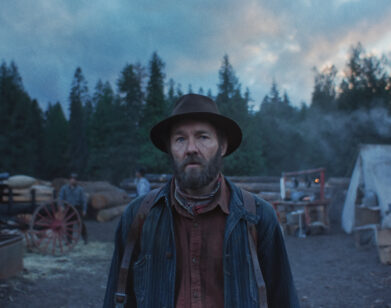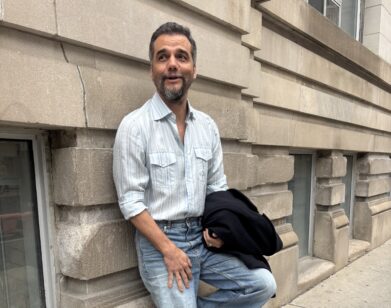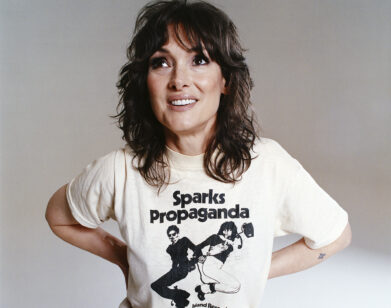Movies!
Renate Reinsve Talks to Nancy Meyers About The Worst Person in the World
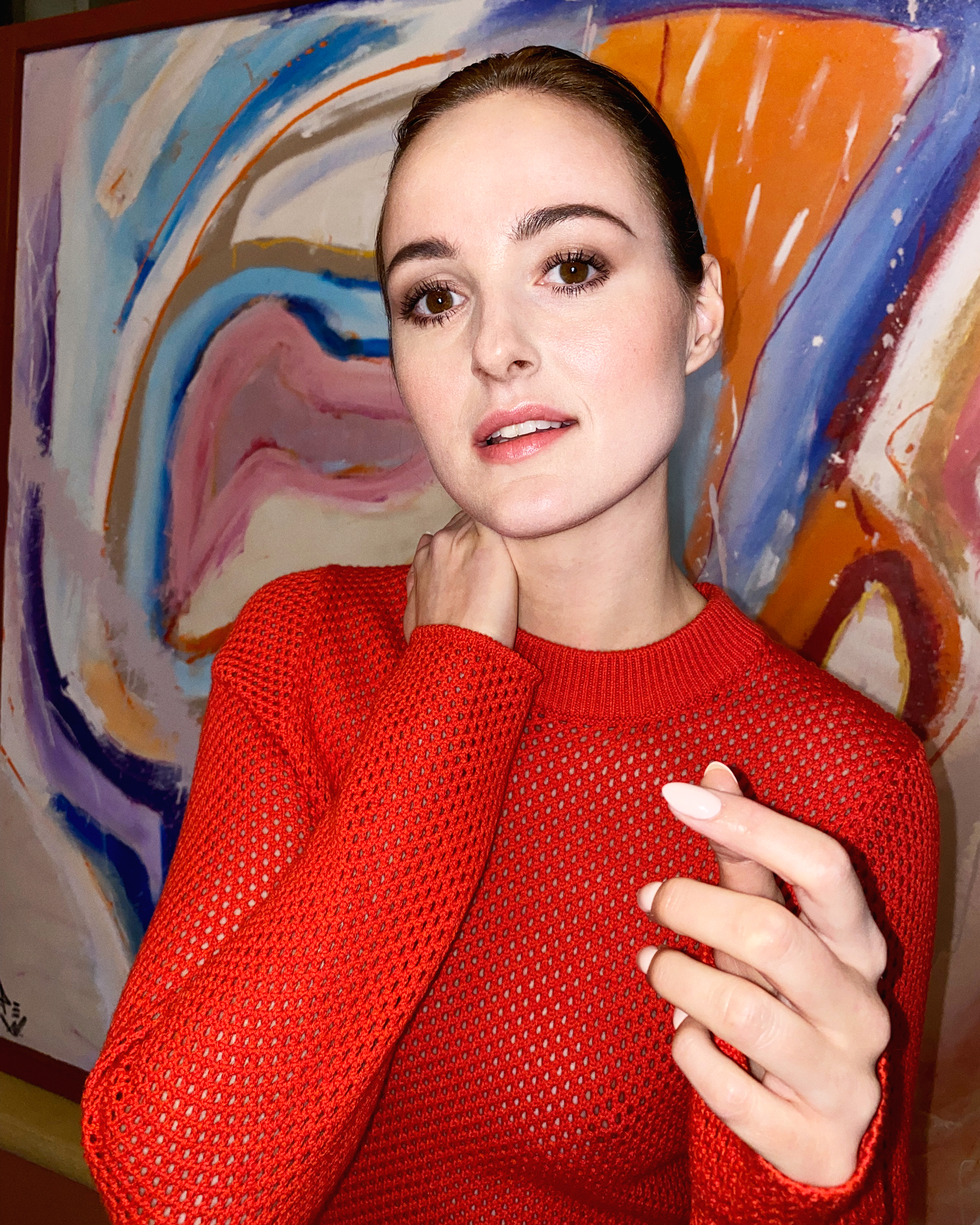
Renate Reinsve was ready to give up on her acting career when she got a call from Joachim Trier. She already knew the Norwegian director, because 10 years prior he had cast her in a bit part in his breakout film, Oslo, August 31. The movie was the first entry in his so-called Oslo Trilogy, and Reinsve had exactly one line. But Trier saw something in her, and when it came time to cast the lead in the third part of his trilogy, Reinsve was his only choice.
The Worst Person in the World premiered at the Cannes Film Festival last year, and Reinsve, who’d never carried a movie before, took home the award for best actress. As Julie, a young woman caught in a love triangle and uncertain about her career path, the 34-year-old actor delivers a restless yet grounded portrayal of someone simply trying to make sense of it all. To use the cliche, it’s a star-making performance.
In the meantime, The Worst Person in the World, which was finally released in theaters last week, has been building on that early success, culminating in Oscar nominations for Best International Feature and Best Original Screenplay. It’s also become a word-of-mouth hit, thanks to people like Nancy Meyers, who let her Instagram followers know that movies like this don’t come around very often. So when we reached out to the writer and director of modern rom-com classics like Something’s Gotta Give and The Holiday to see if she’d be interested in talking to Reinsve about her life-changing role, she couldn’t resist.
———
NANCY MEYERS: Hello Renate, how are you?
RENATE REINSVE: It’s so nice to meet you.
MEYERS: Nice to meet you! I really loved your movie.
REINSVE: That’s fantastic to hear.
MEYERS: I was thinking last night, “What are my favorite scenes?” And there were so many. Usually, if there’s a couple of great scenes in a movie, that movie can almost work. But this movie has so many great scenes, and I felt deeply for all three of the main characters, which is a really hard thing to pull off. It is so easy to make someone good and someone bad. It made me excited about the potential of movies again.
REINSVE: That’s fantastic. The day before Joachim [Trier] called me for this role, I decided to quit acting because I kind of lost hope that I would be in a project that I really, really loved, and that wanted to explore human behavior and our interactions in the time that we live in, and being really serious about that.
MEYERS: Exactly.
REINSVE: Joachim has built up his voice over 20 years of filmmaking. He has a very powerful way of telling stories.
MEYERS: Stick with him!
REINSVE: [Laughs]
MEYERS: Don’t get sucked in over here. I’m not saying don’t make American movies, but—
REINSVE: I know what you mean! You spend so much time on a project, so in the future I really want to make sure it’s with someone who wants to work in the same way as me.
MEYERS: Being a writer-director, I’ve been on the other side of that, where I meet with actors and I’m looking for that, too. And speaking of actors working with directors, I read that you watched Diane Keaton movies and interviews to help you prepare.
REINSVE: Yeah.
MEYERS: I’ve made four movies with her, and the funny thing is, the first time I saw your movie, I texted her the next morning and said, “Hey, I just saw a movie, and there’s an actress in it that reminds me of you.”
REINSVE: Really? Wow.
MEYERS: Like Diane’s work, your performance feels spontaneous. You make moments feel fresh, and that’s really hard to do, because we all pour over our scripts. We make notes. We have rehearsal, and then you get to set, and do take after take. So to keep it that fresh, that’s where it reminded me of Diane. In the movies I’ve made with her, sometimes I can be on set, and the script supervisor’s next to me, and I’ll look over at her script and say, “That’s not the line, is it?” And she says, “Word for word.”
REINSVE: It has so much to do with the culture that the director creates on set, too. I’ve experienced that twice, with two directors. And I haven’t done much film or TV.
MEYERS: That’s crazy, by the way. I would have thought you’d be the number one movie star in Norway.
REINSVE: [Laughs] Thank you so much. But Joachim creates a collective culture on set. So it’s not about me going in, being the lead, and doing my thing. It’s about finding the dynamic between the characters in the scene.
MEYERS: Diane’s like that as well. She’s the opposite of a prima donna. One thing she did for many years was listen to music on set, and I also play a ton of music on set. It helps me and it helps the actors, because it’s a language we can all share in.
REINSVE: We did that a lot on this movie too, actually.
MEYERS: And she loves to work off of other people. I think that’s a real strong suit of hers, to respond in the moment. So why were you watching her?
REINSVE: Because of the messiness. With her, things seem a little, not out of control, but not in control. So it’s never contrived, it’s just very playful.
MEYERS: Agree. I was listening to a podcast where you said that Joachim is really precise, knows what he wants, but also wants to create a free atmosphere. I thought, “I could learn from that.” How does he create an atmosphere that is both free and precise?
REINSVE: We’d have long conversations about the philosophy around love and life, and really be honest about that moment when you fall in love. You try to be the most charming, cool, version of yourself, but inside you might be feeling shameful and scared. Then when you get to set, just forget everything.
MEYERS: There’s a moment in the film when your character is moving in with her boyfriend, and she’s unpacking her books, and there’s this shot of you, alone, where you just take a moment to feel your own happiness. Was that a written moment, or did that just happen and he had that camera on you?
REINSVE: That’s a good question. Both of her relationships in the movie were written in contrast to each other. Her relationship with Eivind was more physical, raw, and more intuitive. Her relationship with Aksel was more grown up, more intellectual, and felt safer. We were there on set, and at that moment we were like, “This relationship lacks love and happiness, too. We need it.” So a lot of that moving-in sequence is improvised. We did it there and then because we needed it.
MEYERS: Oh, so great that you realized that at the time. By the way, I did not find Julie to be the worst person in the world. Was that the title on the script that you were given? Was it in your head all the time?
REINSVE: It was the title of one of the chapters first, and then they used it as the title of the movie. A very important aspect was that she couldn’t accept herself, and that she didn’t like herself and her choices.
MEYERS: Welcome to your twenties. Nobody wants to relive them.
REINSVE: [Laughs] I know. I’m so happy I’m over them.
MEYERS: That’s why I thought, “Is she the worst person in the world? Or is she just young?”
REINSVE: She feels like she’s the worst person in the world. And then she learns to accept herself and to be at peace with who she is.
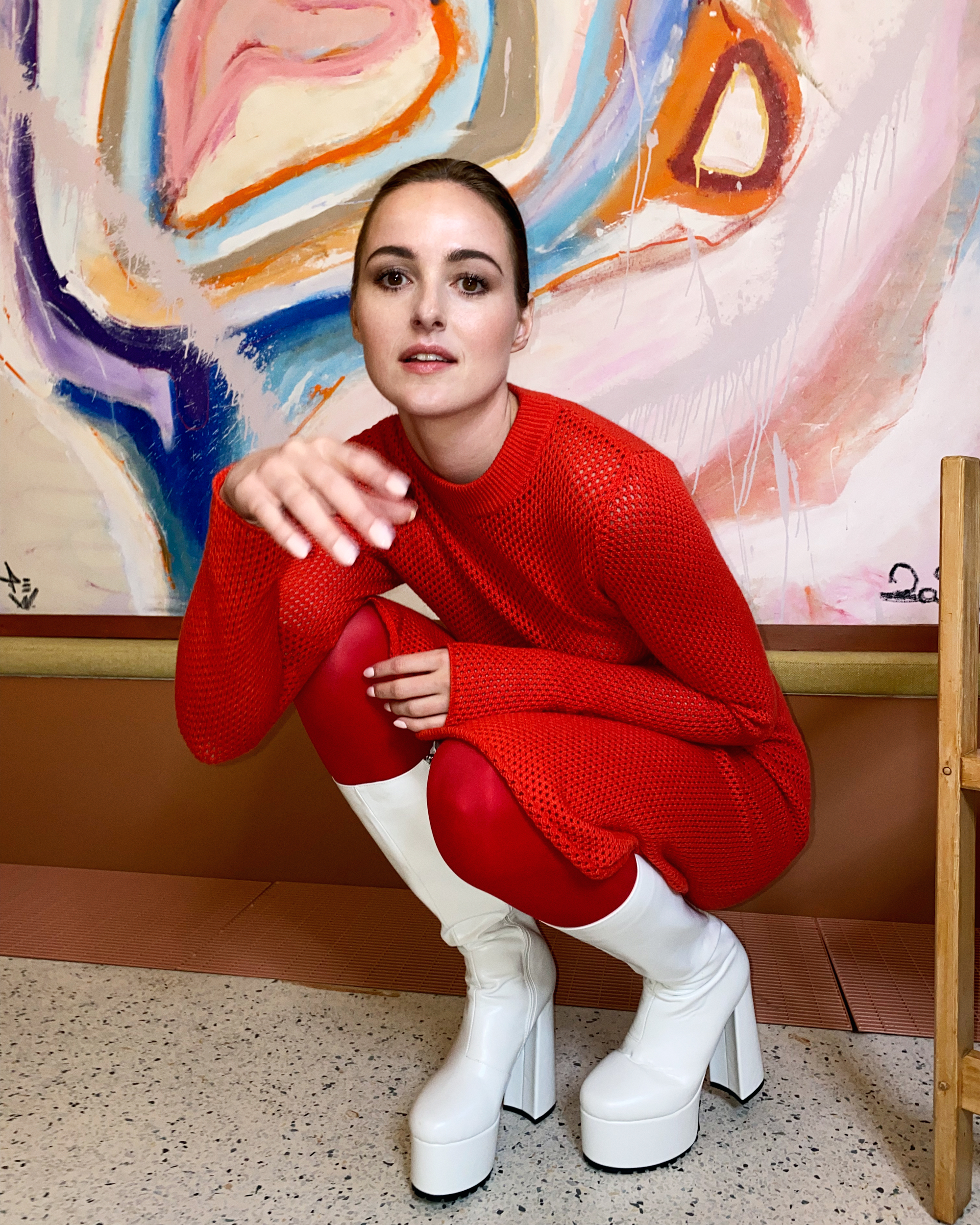
MEYERS: The sequel can be The Best Person in the World. So how long was the prep? Because it sounds like you had lots of conversations. How did all that go?
REINSVE: We were supposed to shoot not long after I got the script. But then it was pushed twice because of Covid. So I had actually a year to prepare, and I was scared the whole time. I prepared a little bit every day. I couldn’t have a day where I didn’t work on it.
MEYERS: Wow.
REINSVE: It was a big relief to finally get to the point where we started shooting.
MEYERS: I don’t want to spoil anything, but the movie has a remarkable third act. I did not see that coming. When the moment comes where Aksel tells you what you mean to him, well, I was just so moved by that. What was that scene like for you to play?
REINSVE: That was the first scene with Anders [Danielsen Lie], in the whole movie.
MEYERS: Wow. You started at the end?
REINSVE: Yeah.
MEYERS: For production reasons?
REINSVE: Yeah! It was in the middle of Covid, and we were in the hospital. So it was very hard to get in there in the first place. But it was a complicated scene because it was hard to make a lot of big choices with that character, because she’s so complex. So we tried different versions, like one where she just takes it in. But in the version that is used, she can’t really take it in, and I felt when I was acting out that scene, that I didn’t do enough.
MEYERS: Oh, no, I’m here to tell you you’re wrong. I read you loud and clear. It was so touching. I want to go back to one thing, which you started with, which was that you were going to quit acting, and then this script showed up. And the other part of that story that I’ve heard, is that you had one line in one of Joachim’s movies ten years before that.
REINSVE: Yeah, in Oslo, August 31st.
MEYERS: What happened in those 10 years? Did you become friends? How did this script arrive on your doorstep after one line in a movie 10 years ago?
REINSVE: For that one line, I had to stay on set for nine days of a 21-day shoot. So I got to know both Joachim and Anders, who was in the movie. It was a party scene, and my line was, “Let’s go to the party.” I was kind of pulling people, and being the driving force to go to the party. Joachim appreciated that I didn’t do more than I had to do. And I took it seriously, so he knew that he could trust me with anything.
MEYERS: But still, another 10 years go by.
REINSVE: Because we kind of became friends, we’d meet here and there and would always end up in deep, existential conversations. Like, “Hey, how are you?” “Yeah, I’m good. I’m going through this.” “Oh yeah? I heard this philosopher, he said this.”
MEYERS: He was like-minded.
REINSVE: Exactly. And he knew I’d done a lot of theater. Isabelle Huppert came to see a play that I did in Norway because she’s friends with the director, and she was like, “You’re really good.” And she told Joachim. That was the summer where he really decided to write this role for me, because he was like, “She’s not getting a lead, so I’ll write her one.”
MEYERS: That sounds almost made up.
REINSVE: I know. It’s so strange.
MEYERS: And wonderful. Did you grow up watching American movies?
REINSVE: I grew up in this really small town, and I wasn’t that exposed to much films or art or anything. I watched MacGyver and shows like that. But the first movies that blew me away were by David Lynch. That was something I’d never seen before. Today I like filmmakers like Paul Thomas Anderson and Charlie Kaufman, whose writing has influenced me a lot.
MEYERS: What are your thoughts on superhero movies? Do they appeal to you?
REINSVE: Hmm.
MEYERS: Based on Charlie Kaufman, P.T. Anderson and David Lynch, I’m thinking it’s not your thing.
REINSVE: I think they’d be fun, but I don’t know. What’s your take on them?
MEYERS: I’ve seen two of them. I can admire the work that goes into it, because it’s so foreign to me, but it’s not where my heart is either.
REINSVE: I agree. I’m just a little afraid to say it out loud, you know?
MEYERS: I know, you made me say it. [Laughs]
REINSVE: Yes. I respect them, but I haven’t seen that many.
MEYERS: Film is emotional. And I personally find those things that you’re supposed to feel in those movies are not my favorite emotions to feel. Seeing people find their way and fall in love and figure out relationships and work, that’s what I’ve written in all my movies. That’s the world I love.
REINSVE: Yeah, me too.
MEYERS: That’s the world I live in. The others are just too fantastical for my taste. But I can see the entertainment value, especially if you’re young. They’re literally comic books, but I liked comic books like Archie. Is there anything else you’d like to talk about?
REINSVE: You know, ever since it came out, I watch The Holiday with my sister like four times a year, and whatever state you are in your life will affect the way you see it.
MEYERS: Oh, I’ve had that experience with movies as well. And thank you for watching it so much, by the way.
REINSVE: [Laughs]
MEYERS: During this period of time I’ve never seen more movies. And I’m going back to older movies, because when I first saw them, I was young and there were things about them I didn’t fully understand at the time. It’s been very eye-opening, and I’ve fallen more in love with the movies I love.
REINSVE: And the way everyone has been so isolated, everyone has been forced to confront themselves and really learn about themselves in a hard way. And that’s what a good movie does, too, and that’s what happens to Julie. She’s forced to confront some stuff in herself, and through that she learns to be at peace with herself. She surrenders to the chaos.
MEYERS: Yes. You can’t control it, but you can figure out how to navigate it.
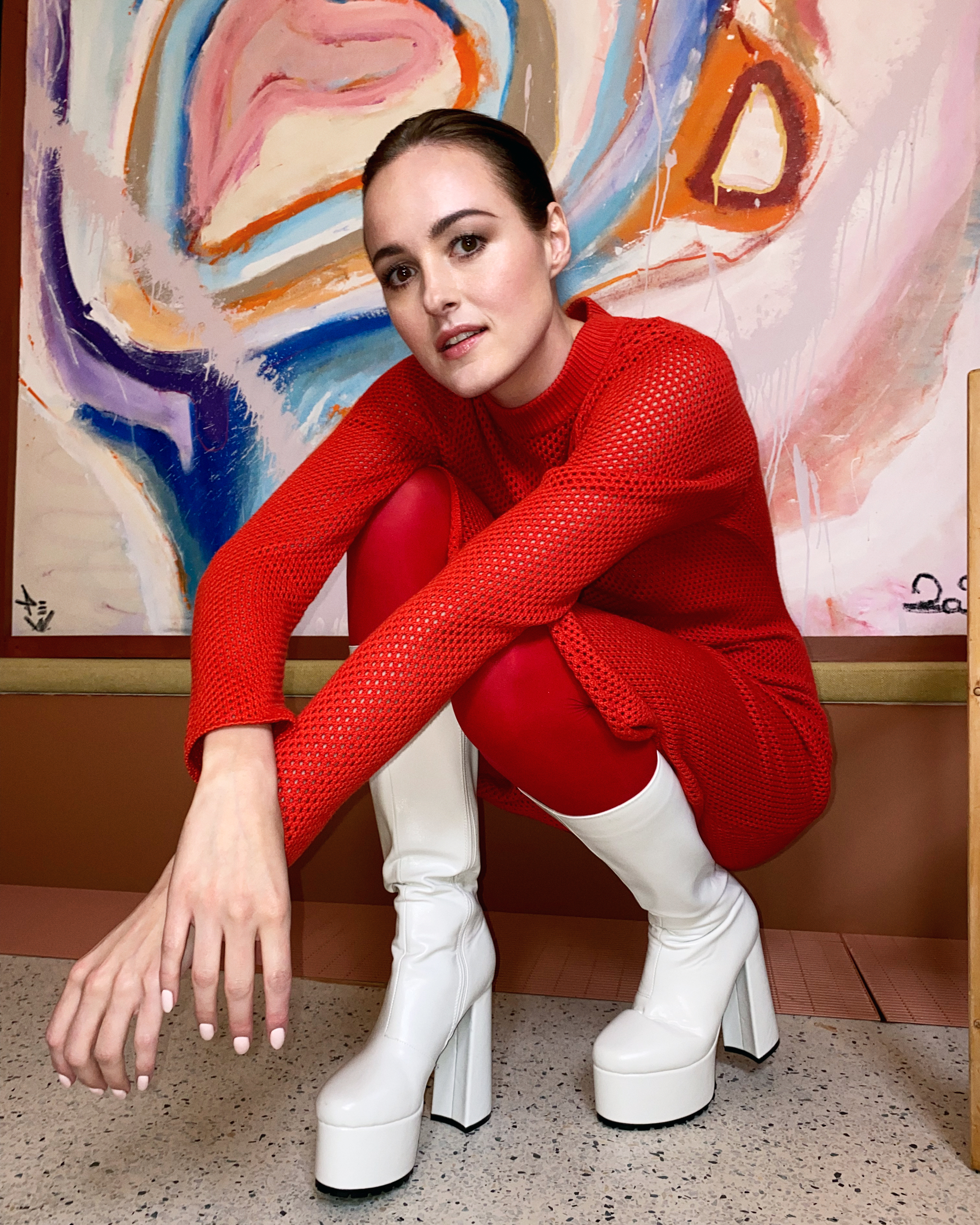
Makeup by: Linda Wickmann

